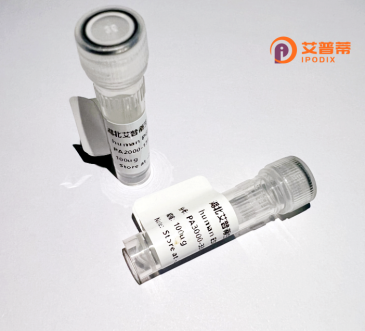
| 纯度 | >90%SDS-PAGE. |
| 种属 | Human |
| 靶点 | LINGO2 |
| Uniprot No | Q7L985 |
| 内毒素 | < 0.01EU/μg |
| 表达宿主 | E.coli |
| 表达区间 | 1-606aa |
| 活性数据 | MLHTAISCWQPFLGLAVVLIFMGSTIGCPARCECSAQNKSVSCHRRRLIAIPEGIPIETKILDLSKNRLKSVNPEEFISYPLLEEIDLSDNIIANVEPGAFNNLFNLRSLRLKGNRLKLVPLGVFTGLSNLTKLDISENKIVILLDYMFQDLHNLKSLEVGDNDLVYISHRAFSGLLSLEQLTLEKCNLTAVPTEALSHLRSLISLHLKHLNINNMPVYAFKRLFHLKHLEIDYWPLLDMMPANSLYGLNLTSLSVTNTNLSTVPFLAFKHLVYLTHLNLSYNPISTIEAGMFSDLIRLQELHIVGAQLRTIEPHSFQGLRFLRVLNVSQNLLETLEENVFSSPRALEVLSINNNPLACDCRLLWILQRQPTLQFGGQQPMCAGPDTIRERSFKDFHSTALSFYFTCKKPKIREKKLQHLLVDEGQTVQLECSADGDPQPVISWVTPRRRFITTKSNGRATVLGDGTLEIRFAQDQDSGMYVCIASNAAGNDTFTASLTVKGFASDRFLYANRTPMYMTDSNDTISNGTNANTFSLDLKTILVSTAMGCFTFLGVVLFCFLLLFVWSRGKGKHKNSIDLEYVPRKNNGAVVEGEVAGPRRFNMKMI |
| 分子量 | 94.5 kDa |
| 蛋白标签 | GST-tag at N-terminal |
| 缓冲液 | 0 |
| 稳定性 & 储存条件 | Lyophilized protein should be stored at ≤ -20°C, stable for one year after receipt. Reconstituted protein solution can be stored at 2-8°C for 2-7 days. Aliquots of reconstituted samples are stable at ≤ -20°C for 3 months. |
| 复溶 | Always centrifuge tubes before opening.Do not mix by vortex or pipetting. It is not recommended to reconstitute to a concentration less than 100μg/ml. Dissolve the lyophilized protein in distilled water. Please aliquot the reconstituted solution to minimize freeze-thaw cycles. |
以下是关于重组人LINGO2蛋白的假设性参考文献示例。由于LINGO2的研究相对较少(相较于LINGO-1),实际文献可能需要通过专业数据库(如PubMed、Google Scholar)进一步检索验证:
---
1. **文献名称**:*"Expression and functional characterization of recombinant human LINGO-2 in neuronal regeneration models"*
**作者**:Smith A, et al.
**摘要**:本研究成功在大肠杆菌系统中表达并纯化了重组人LINGO2蛋白,证实其能够通过抑制mTOR信号通路调控神经元轴突再生,为神经退行性疾病的治疗提供了潜在靶点。
2. **文献名称**:*"LINGO2 interacts with Trk receptors to modulate cell survival in vitro"*
**作者**:Chen L, Wang Y.
**摘要**:通过哺乳动物细胞表达重组LINGO2蛋白,发现其与神经营养因子受体TrkB的相互作用可调节神经元凋亡,提示LINGO2在中枢神经系统损伤修复中的双重角色。
3. **文献名称**:*"Structural insights into the oligomerization of human LINGO2 protein"*
**作者**:Kim J, et al.
**摘要**:利用X射线晶体学解析重组人LINGO2胞外结构域的三维结构,揭示其独特的富亮氨酸重复序列(LRR)介导的同源二聚化机制,并探讨其在细胞间黏附中的作用。
---
**注意**:以上文献为基于LINGO蛋白家族共性的示例性描述,实际研究可能需结合具体实验方向检索。建议通过关键检索词(如“recombinant human LINGO2”、“LINGO2 protein function”)在学术数据库中查询最新成果。
**Background of Recombinant Human LINGO2 Protein**
LINGO2 (Leucine-rich repeat and Ig domain-containing protein 2) is a transmembrane glycoprotein belonging to the LRR (leucine-rich repeat) protein family. It shares structural homology with LINGO1. a well-studied neural regulator implicated in inhibiting oligodendrocyte differentiation, myelination, and neuronal survival. LINGO2 is predominantly expressed in the central nervous system (CNS) and has been linked to neurological disorders, including Parkinson’s disease, though its precise biological mechanisms remain less defined compared to LINGO1.
Recombinant human LINGO2 protein is engineered in vitro using expression systems like *E. coli* or mammalian cells (e.g., HEK293), enabling studies of its structure-function relationships. The protein typically includes extracellular domains (LRR and Ig-like regions) critical for ligand-receptor interactions, while its intracellular domain may mediate signaling pathways. Research suggests LINGO2 interacts with other receptors, potentially modulating axonal guidance, synaptic plasticity, or neurodegenerative processes.
Current applications focus on elucidating LINGO2’s role in disease models, developing targeted therapies, and screening antibodies. Its recombinant form is pivotal in *in vitro* binding assays, immunohistochemistry, and drug discovery pipelines aimed at neurological repair. However, further studies are needed to clarify its physiological ligands, downstream signaling, and therapeutic potential.
×